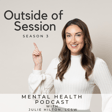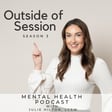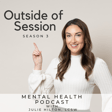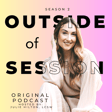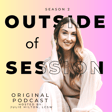Become a Creator today!Start creating today - Share your story with the world!
Start for free
00:00:00
00:00:01

Building Self-Trust & Resiliency
Outside of Session is back! In this season’s premiere, Julie discusses the importance of building Self-Trust in the healing process and how it paves the way to mastering resilience.
Connect with me!
Instagram: @empower_counseling
julie.hilton@empowercca.com
Transcript
Introduction to Season 3
00:00:06
Speaker
Welcome back to Outside of Session. I'm your host, licensed clinical social worker and therapist BFF, Julie Hilton. Season three is all about navigating life's challenges and finding balance. We're continuing the conversations around mental health and I'm once again joined by expert guests who share their stories and tips and hopes to inspire you on your journey of healing and growth.
00:00:36
Speaker
Hi everyone, welcome back to Outside of Session. I can't believe we're starting season three already. It seems like just the other day I was starting season one and and it felt like I totally didn't know what I was doing and sometimes I still don't, let's be honest. But now we're getting started on season three.
00:00:57
Speaker
I have to say thank you again for all the love that everyone has shown, especially last season with all of the interviews that I did with so many amazing guests. I had such great feedback and I just appreciate each and every one of you for sticking with me.
00:01:12
Speaker
So here we go again and I have thoroughly missed doing this in the months that I've taken off.
Format and Topics of Season 3
00:01:17
Speaker
This season is going to be kind of like a combination of seasons one and two. So I've got some episodes where it's just going to be me sharing some thoughts and tips on different topics that are important to me. And then of course I've got some amazing new guests coming on to share in their areas of expertise as well.
00:01:36
Speaker
Some of the guests this season aren't just mental health professionals like in the past, but we've got some other really cool experts coming on too, so be on the lookout for that. Just to give you a sneak peek of some of the upcoming episodes, next week we're going to be talking about healing the mother-daughter wound.
00:01:52
Speaker
And later in the season, we've got topics like men's mental health. I've got a couple of episodes on religious trauma um because that's been coming up a lot in my practice lately. So I thought it was important to have a couple of episodes on that this season. And then I've got more episodes on ADHD and autism and women coming and just so much more. It's going to be an awesome season.
Impact of Trauma on Self-Trust
00:02:14
Speaker
um But today, jumping into episode one, I want to start out by sharing with you something that has just been on my mind a lot lately and I thought would be a great place for us to start and maybe offer some encouragement today as well. I feel like as a therapist, I go through these phases where different themes come up and it ends up like applying to a lot of different clients at the same time and maybe in my own life too.
00:02:41
Speaker
And so I end up just like chewing on these topics for a little bit and like wrestling with it and thinking about it a lot. um And what's been coming up for me is the idea lately of self trust, which is actually something that I've been processing and thinking about for a really long time.
00:02:56
Speaker
but also about how self-trust applies to the concept of resiliency. So I'm gonna talk about both of those a little bit separately and then kind of bring them together in the end of this episode to show you how I feel like they are starting to like weave together in my practice.
00:03:13
Speaker
One of the things that I have noticed is that when someone lives through trauma, and again, that could be like the big T trauma that we've talked about before, um like something that you live through in adulthood, it can be relational trauma, it can be complex trauma from childhood. Regardless of what it is, one of the things that I seem to always see being sacrificed is a person's self trust.
00:03:40
Speaker
it feels like it's always a result is that people stop trusting themselves because of the trauma that happens to us we start to question ourselves and our ability to make good decisions for ourselves and i think that's a huge thing that gets internalized is this belief that on some level what happened was our own fault Like even kids are notorious for doing this. They question whether um maybe if they had done something differently or if they had quote-unquote been good enough that maybe this bad thing wouldn't have happened to them. So one of the things that we walk away with after trauma is oftentimes a subconscious distrust of ourself.
00:04:22
Speaker
And honestly, that's one of the things that I work on in therapy with women especially, is learning how to trust yourself again and realizing that you do have intuition. We all do. And it can be trusted and you have to learn how to listen to it again.
00:04:38
Speaker
But here's one of the struggles that I see happening frequently. When you have, because of your trauma, when you have the belief that inherently that you are no longer trustworthy, but you want to believe that you're trustworthy, and that's how I feel like our subconscious belief and our conscious mind kind of war against each other sometimes, um is you're constantly trying to prove to so yourself that you are trustworthy.
00:05:02
Speaker
But what I see happening is that people end up like naturally putting themselves in a situation to test to see if they're trustworthy. But then they put the confirmation of that outside of themselves. And what I mean by that is that we decide that if the results of the decisions that we make are what we want them to be, then that means that's evidence that we are trustworthy. And that's actually a pretty dangerous position to put yourself in. And let me tell you why.
00:05:33
Speaker
I see this playing out in relationships a lot um when people are questioning whether or not they have good decision making or when they're trustworthy when it comes to like choosing a partner. I'm going to use this as an example because it's pretty easy to follow. So people will say if this person treats me well and let's say um if this person stays faithful to me, then that means I'm trustworthy at making good decisions for myself.
00:06:00
Speaker
And the problem with that is that you have now put your trustworthiness in the hands of someone else and you have absolutely zero control over whether or not they decide to treat you well and stay faithful to you. So that can create a ton of anxiety in a relationship because now Not only are you depending on them to treat you well for, I don't know, like the the sake of them treating you well, but also you're looking to them to validate whether or not you can trust yourself. So it's putting way too much weight and giving them way too much control over a belief about yourself. At that point, you're letting their behavior dictate whether or not they are trustworthy and whether or not you are trustworthy. And that's just wildly unfair to you.
Cultivating Self-Trust and Resilience
00:06:50
Speaker
So if you notice that something doesn't go the way that you thought, And you immediately blame yourself and it creates all of this anxiety in you. And you start to use language with yourself of like, I should have seen this coming. Um, why didn't I see this person's bad behavior ahead of time? That's a really good indicator that you have given them too much control over the way that you view yourself. And it's time to pause, backtrack a little bit and kind of like take inventory of what's going on inside.
00:07:25
Speaker
So what I tell my clients pretty frequently is that the shift that has to happen so that you can gauge whether or not you are trustworthy is not based on the outcome of the decision, but it has to be placed on where you were when you made the decision.
00:07:42
Speaker
like where you were with yourself. So the two things that I always ask myself was, did I fully look at all the information that I actually had in that moment? Meaning, did I make a decision with all of the information in front of me and making sure that I didn't purposely like excuse something or look away from a red flag? And if I did, then I have to ask myself, like, what was the reason behind that? Like, why did I do that in the moment?
00:08:06
Speaker
And then secondly, did I make a decision coming from a place of my wise self or was that decision made out of a deeper fear? So the first part of that is pretty easy to gauge whether or not you actually had the information in front of you.
00:08:22
Speaker
Because lots of times when we get into relationships, or maybe it could also be like a new job or something like that, where we've made a decision for ourselves. A lot of times when we're getting into that, and we realize eventually that the reason why things didn't go well, we realize what you couldn't have foreseen that in the beginning. So either this person didn't show you certain sides of themselves, or they were only showing you the good in themselves, which I mean, honestly happens pretty frequently in the beginnings of relationships, right?
00:08:51
Speaker
um But if that is the case, and you can fully say, it's not that I didn't look at these things in the beginning, I just, they weren't showing me these things in the beginning. So if that's the case, then you can't be held liable for anything that person does to you. And you genuinely didn't know was going to happen in the beginning. So they misled you, you don't have to own any of that.
00:09:14
Speaker
And then you can separate yourself from it and say that this wasn't about my decision making. This wasn't about my trustworthiness. This is about them and their actions and they need to be held accountable for it. um I also really love the saying, don't judge yesterday's decisions with today's wind wisdom.
00:09:32
Speaker
So you have to remind yourself of what it was like when you didn't have the full picture in the beginning and how much more information you have, like at the end of the relationship or after you've been in the job for a really long time and just like remind yourself. The reason why you signed up for it was in the beginning was because you didn't have all of this information. So you have all of this wisdom and information today that you just didn't have them.
00:09:56
Speaker
But the second part of that is where you do have to do a little bit more of like soul searching to decide where was your motivation coming from when you first made that decision. And if you made a decision out of a place of a fear of yours, that doesn't necessarily make you untrustworthy, but it does mean that you need some healing in that area.
00:10:21
Speaker
So if you make a decision decision about a relationship out of a fear of, let's say, being alone or a fear of being rejection, something like that, then it doesn't mean, again, it doesn't mean that you are untrustworthy. It just means that you weren't at your best when you were making that decision. And that also clues you in on where it does your own, like, personal work and personal growth need to come from.
00:10:48
Speaker
So again, like when you're looking back on these things and saying, I got into this relationship that blew up in my face, it ended up being terrible. If you lean towards I make bad decisions, you're blaming yourself for it, you have to back up and say, was I making the decision when I was at my best?
00:11:09
Speaker
And if I wasn't, what fear was leading me to think that that was a good decision in the moment. And so you don't come from a place of shame or blame. You just come from a place of saying, I need to heal that fear so that when I decide to get into a relationship with someone, I don't do it because I have a fear of rejection anymore. I don't do it because I have a fear of judgment, you know, something like that. I truly make a decision made out of my best self and my best self is going to make good decisions for me.
00:11:38
Speaker
Let me tell you, when you make decisions out of a place of your most grounded, wise self, you're going to have this feeling of it's not so much about the result of the decision as it is the intention that you had going into it. So it's going to be so much easier to believe. And I also think that this needs to be ah kind of like the goal of this. But to be able to tell yourself, I can be trustworthy and still make mistakes.
00:12:07
Speaker
And I think that's the most important thing to be able to tell yourself is that things turning out in a way that you didn't want them to. um Let's say I took a risk and it didn't pan out the way that I think it should have. And again, this can be with a relationship or a job or whatever, but the end result is not what makes you trustworthy or not. It's your motivation going into it. How well do you know yourself to know that you can feel for certain that you made a decision coming from your best self?
00:12:35
Speaker
And a side note with this, a big thing to consider is that you will probably need to forgive your younger self for the decisions that you've made in the past and any blame that you've carried for them. Any decision that you've made where you weren't at your best self deserves forgiveness because it was coming from a place of a fear that probably was not yours to start with.
00:12:58
Speaker
And here's the thing, once you can create an internal environment of compassion, groundedness, forgiveness of yourself, and make room for mistake, that's when you're going to start to see your best self show up anyways. That's the environment where fear doesn't thrive. And because of that, fear doesn't drive drive your decisions.
00:13:22
Speaker
And the less fear is allowed to drive the decisions, the more trustworthy you're going to start to feel. So it's like, it's like a spiral upper spiral down, you're either going to create an environment where you're allowed to make mistakes. And because of that, your best self shows up, causing you to feel trustworthy, or it's going to be the opposite.
00:13:41
Speaker
So I feel like I kind of just like went on this rant for a little bit there. But the whole point of that is just to say, sometimes we get in our own way of being able to listen to our intuition by believing that we're not trustworthy.
00:13:56
Speaker
So if you can create an environment inside of yourself where you're allowed to make mistakes and explore the different needs that you have, I guarantee your intuition will start to peek through in the way that it's intended to. And that's probably a bit of an oversimplification when we're talking about these like deeply rooted fears and things like yeah that. Yeah, there is a lot of work to be done with that. There's a lot of going back to our younger selves and healing them.
00:14:23
Speaker
um I've got plenty of episodes on that in the last season. um So I'm not saying that it's as simple as just like flipping a switch. But at the end of the day, the more you can create an environment of compassion and forgiveness within yourself, the more trustworthy you're actually going to show up for yourself.
00:14:41
Speaker
So that leads me to the second part of why I wanted to talk about this today, which is the idea of resiliency. So this is another concept that I've just been kind of like chewing on lately, and it's been coming up a lot with a lot of my clients, and even asking myself the question, why is it that some people can live through the most horrendous things it seems like? And they can continue to push through in life, and why do other people seem to get stuck?
00:15:10
Speaker
Because to me, I feel like the opposite of resiliency is feeling stuck and getting stuck in life. And here's what I've noticed. People get stuck when they stop asking themselves to do hard things. And this, I'll be honest, like I struggle to say this a little bit because I don't want to come off as being insensitive. I think that when you've gone through really hard things in life and you're going through like the the healing process, you definitely are going to have to take some time to be gentle with yourself.
00:15:45
Speaker
There's gonna be time where healing requires you to slow down. Oh my gosh, so much grief that you're gonna have to work through. You're gonna have to recalibrate your nervous system. And if you've been in fight or flight for potentially years, you're gonna need a slow season. And, and I'm saying and here, not but, and do not let that slow season turn into a slow rest of your life.
00:16:14
Speaker
I think unfortunately some people they, they kind of have this idea or this attitude of I've had enough hard for this lifetime. So I'm never going to ask myself to do anything hard again. And I never learn how to build and to lean into any resiliency. And the thing is, the reason why I hesitate to say this, um, is because again, like I don't want to come off harsh, but at the same time, I totally get where they're coming from. And it's absolutely understandable to be at a place of like not asking yourself to do more hard things. When I think about some of the things that people have gone through, and they have had these like
00:16:54
Speaker
Let's say you've gone through a traumatic divorce and so you never ask yourself to date ever again. There's a part of me that understands that. Or if you've gotten into a really bad car wreck and you decide to never drive again, I think most people would say that makes perfect sense and they don't blame you for it, right?
00:17:13
Speaker
But both of those decisions rob you of something really good in life, like ongoing, because of something that happened to you in the past. So it continues to steal from your future. And that just breaks my heart. So yes, you might need a season of softness, you might need to stop hustling and stop forcing yourself to go, go, go all the time.
00:17:36
Speaker
but you don't get to stop advocating for yourself though. There's a difference between it being gentle with yourself versus accepting limits that maybe we just don't like and using it as an an excuse to give up on ourselves. If you aren't careful you can let the hard things in life shut you down but you can't let them define you because this is your life and you only get one shot at that and I feel like that's a little bit cheesy but the older I get the more life is going by really fast.
00:18:06
Speaker
and you really start to realize that it's gonna be gone before we know it. We get one shot at this. So, resiliency to me, like my definition of it, is asking yourself to endure short-term discomfort for long-term gain.
Therapy and Lifestyle Changes for Resilience
00:18:26
Speaker
It's taking care of yourself in ways that you honestly don't want to. Resiliency is like building a muscle. You're causing these micro tears in it so that it builds back stronger. It's doing the uncomfortable thing over the comfortable thing.
00:18:41
Speaker
I also believe that resiliency isn't necessarily something that you have, it's something that you build, which means that we are all capable of it, even if it doesn't seem like it comes natural to you. um So when I was thinking about today's episode, I was like, trying to come up with what are some characteristics of resilient people. And to me, people who are resilient, do things like they set good boundaries,
00:19:05
Speaker
that are wildly uncomfortable in the beginning. Setting boundaries is always so hard. It never feels comfortable, it never feels natural. But resilient people, I think, have really good boundaries, no matter how hard they are to set. I think they tend to push themselves outside of their comfort zones um in order to, again, have like a long-term benefit, a long-term challenge to themselves.
00:19:30
Speaker
I think that they let themselves fall and fail and then they get back up. And again, that's because they know that the outcome of the failure is not what determines whether or not they should have tried to start with. I think resilient people often apologize when they need to.
00:19:49
Speaker
I think they dream big. I think they forgive people and they hold people to boundaries if needed. So I think like with forgiveness comes also holding people accountable and it doesn't mean that you let them run all over you like you have good boundaries with that as well.
00:20:08
Speaker
I think resilient people carve their own way um in their life. And I also ask for help when needed. So resiliency doesn't mean that you go with things alone. I also think that they know how to handle their triggers.
00:20:24
Speaker
um but Let's talk about that one. Because I think it's really important to know that resilient people don't stop having triggers, like that's not the goal. But I do think that they know how to care for themselves through their triggers. So in other words, if they're asking themselves to do something hard, that can stir up a lot if we've gone through hard things before, like asking ourselves to do hard things can stir up our trauma.
00:20:49
Speaker
And so I don't think it's a matter of people who end up being really resilient in life aren't triggered by the past anymore. I think it's just that they know how to care for themselves really well through the triggers. And they are often vulnerable enough to go to therapy to figure out how.
00:21:08
Speaker
So, and here's another side note, if you want to go to therapy, or if you want to heal, so you go to therapy, that's great. But you have to do more than just show up. And here is a just a little therapist rant for you. Even people in therapy can avoid doing any work.
00:21:26
Speaker
There are a lot of people who are in therapy that aren't making any changes because they're not actually doing any work. They think that they just have to show up and it's so much more than that. You have to be prepared to make lifestyle changes too. Yeah, go to therapy, but you better go for walks in the afternoons too. You better be willing to sacrifice so that you get better sleep. You better make sure that you're journaling and making it a habit, whether you feel like it or not, like all the different skills that you learn in therapy, you have to be willing to make those lifestyle changes.
00:21:56
Speaker
A person with resilience is not someone who lets their mood dictate their actions. And I think that that's really important is that they're not asking themselves, do I feel like doing this or not? Again, there are people who seek out doing things that are uncomfortable because they see the value and the benefit in it.
00:22:13
Speaker
um Also, when when I look at people who have progressed the most, I see people who took ownership of their life outside of just the therapy session. So yes, they bring it back into therapy. But even outside of therapy, like they own their shit. They stop feeling bad for the accountability that they need to take over their life. And they accept it not with shame, but with love. So when there are things that they need to change, and they need to take accountability on things,
00:22:43
Speaker
They don't do it in a way of beating themselves up, but they realize that they're going to be uncomfortable with this for a little bit, but out of love for themselves, they're going to make those changes.
Building Self-Trust and Intuition
00:22:53
Speaker
I feel like if you're waiting until life stops throwing you hard situations to be able to work on these things, you're just never going to get there. It's during the hard situations that life is not going to let you escape, that you learn to practice resiliency. And every time you choose to do the harder thing, you also learn to trust yourself more.
00:23:15
Speaker
And I guess that's where this ties back into self trust is that you if you never ask yourself to do something hard, you're you'll never start to build back the self trust because you can't build trust from a stagnant position because you're never challenging whether or not you're trustworthy.
00:23:36
Speaker
So I'm going to, I'm going to wrap up this rant. I'm going to land this plane. And at the end of the day, hard things have happened to you. Yes. But will you ask yourself to do more hard things? I believe if you trust yourself, you will.
00:23:53
Speaker
So I hope this message is encouraging. I hope that you're reminded today that you do have good intuition. And if you've lost touch with it, that's okay. It's not your fault, but you can find it again. You are a trustworthy person and you can become resilient and create the like life that you want for yourself.
00:24:11
Speaker
That's all I have for you guys today. I'm so excited for you to hear the rest of season three. um Make sure you tune in next week where I'm going to be interviewing a good friend of mine and fellow therapist Monique and we are going to be talking about the mother, daughter, the wound. You're not going to want to miss out. I hope everyone has a good week and we'll talk to you next time. Bye.
00:24:32
Speaker
Thanks for tuning in to this episode of Outside of Session. Remember, while I am a licensed therapist, this podcast is not a substitute for individual therapy. The contents of this episode are for educational and entertainment purposes only. If you are having a mental health emergency, please dial 911 for immediate assistance or dial 988 for the Suicide and Crisis Lifeline.
